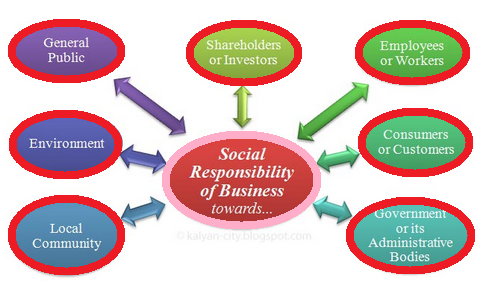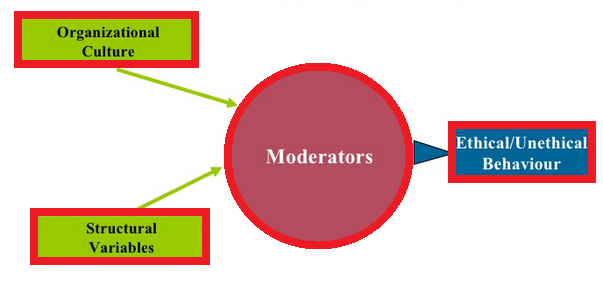Social Responsibility and Managerial Ethics (Managerial Function)
Social Responsibility
Social responsibility denotes differentiating right from wrong and doing the right thing. It means being a good corporate inhabitant. Social responsibility is management's obligation to make choices and take actions that contributes to the well-being and interests of society as well as the organization. The concept of CSR is a new phenomenon in the corporate world, the theoretical structure reveals that this concept is developed since many decades. Windsor stated that during 1920, some business leaders hold the idea of responsibility and responsiveness practices (Windsor 2001). Experts describe that social responsibilities can be defined as the obligation of management towards the society and others concerned. The issue of social responsibility highlighted to public standing as a result of highly-publicized events such as the fall down of Enron and the James Hardie asbestos scandal in Australia.

Executives of organizations are more concerned to develop moral values in business operations. Social responsibility can be explained as "the obligation of the firm to use its resources in ways to benefit society, through committed participation as a member of society, taking into account the society at large and improving the welfare of society at large independent of direct gains of the company" (Weile et al., 2001). Many experts have shown the significance of Social responsibility in boosting the performance of private sector firms. Business professionals, government bureaucrats, and researchers are inclined to execute the doctrine of corporate social responsibility in business operations. Basically, business scholars and corporate senior executives sincerely work for organization to maximize revenue for stakeholders. But scenario is changed in business culture today. Corporate must think for public interest and behave in socially responsible manner. Lantos stated that social responsibility approach consists of three components which include ethical, philanthropic and strategic (2001). Companies strive to survive by the resourceful use of the factors of production and other facilities of the culture. This process puts organizations in an interdependent relation with the government, the community at large and the environment. Such interdependence gives rise to a series of broader responsibilities to society in general (Mullins, 2005). Mullins further demonstrates that the social responsibilities are both internal and external to the organisations. Social responsibilities of companies towards their workers extend beyond the terms and conditions of the contract to include justice in treatment, democratic functioning of the organisation, training in new skills and technologies, effective personnel and employment relations policies and practices, and provision of social and leisure facilitates (Mullins, 2005).
Social responsibility approach has some dimension which includes human resources management, health and working in safe environment, adjustment to changing situations and smooth management of environmental impact and natural resources. Externally, this approach considers local communities, business, collaborators, contractors and customers, human rights and global environmental issues. Briefly, social responsibility has positive affiliation with the social structure which is an essential factor in improving the economy of country.
Many business experts assert that social standard influence greatly in decision making on major issues for business. Palmer and Hartley argue that there is a major basis for business organizations to behave in a socially responsible manner. Philosophically, organization maintains moral values to serve consumer and other social institutions such as educational and the religious institutions. Practically, organizations must consider society values, to survive in competitive business world. Business organizations plan strategies for manufacturing products and develop ethical standards according to customer's requirement which is the most instantaneous, powerful and targeted stakeholder. It is a hot issue whether the customer makes appropriate choice in purchasing the goods and services from a company. Although the social responsibility is advantage for social and business organizational, but scholars argue for and against business social responsibility. In an organization, the managers must adopt strategies of social responsibility. Firms have a moral commitment to help society to deal with its problems and to contribute for its welfare. It is the moral practice to do by the business organizations. A measurement should be made of whether the organization is doing such activities as producing goods and services that people need, creating jobs for society, paying fair wages, and ensuring worker protection. Social responsibility to workers extends beyond terms and conditions of the formal contract of employment and gives recognition to the workers as a human being. People today have more expectations of the quality of working life, include justice in treatment, opportunities for consultation and participation, training in new skill and technologies, effective personal and industrial relations policies, and provision of social and leisure facilities. Organization should be given due consideration to the design of work organization and job satisfaction, make very reasonable effort to give security of employment, and provide employment opportunities for marginal groups. Even successful companies took initiative for creating moral cultures and system by involving individual employees in corporate affairs. By providing or supporting some benefits to the workforce can lead to good communities in the business organizations. Good communication in the internal business leads to avoid miss understanding of each other.
To summarise, social responsibility is explained in management literature as the obligation and commitment of managers to take necessary steps to guard and improve society's welfare along with protecting their own interest.
Managerial Ethics
Ethics is the symbols of moral principles and values that direct the behaviour of a person or group with respect to what is right or wrong. Ethics sets standards as to what is good or bad in conduct and decision making. Ethics deals with inner values that are a part of business culture and forms decisions concerning social responsibility with respect to the external environment. A moral issue is present in a situation when the actions of a person or organization may hurt or benefit others. Ethics can be more evidently understood when compared with behaviours governed by laws and by free choice. The main purpose of developing in organization is to enhance workplace behaviour ethics and ethics in leadership. Ethics and ethical reasoning are essential quality of any business culture. Basically, ethics are concerned with human action. It can be considered as philosophy, philosophical thinking about morality, moral problems and moral judgements. Ethics can also be described as a study of what is good or right for human beings, what goals people ought to pursue and what actions they ought to perform.
Theorists have different outlook about ethics in organization
Utilitarian view define that ethical decision are made on the basis of their outcome. A utilitarian approach to morality explains that no moral act or rule is intrinsically right or wrong. Rather, the rightness or wrongness of an act or rule is solely a matter of the overall non-moral good such as pleasure, happiness, health, knowledge, or satisfaction of individual desire, produced in the consequences of doing that act or following that rule. In sum, according to utilitarianism, morality is a matter of the non-moral good produced that results from moral actions and rules, and moral duty is instrumental, not intrinsic. Morality is a means to some other end, it is in no way an end in itself.
Right view respects and protects individual liberties and privilege. This theory of ethics denotes that there are certain fundamental civil, political and economic rights that merit protection or respect because they pertain to the dignity of the human person. Each person has a basic right to be respected and treated as a free and equal rational person capable of making his or her own decisions.
Theory of justice view reveals that managers impose and enforce rules fairly and impartially. Central to this effort is an account of the circumstances of justice, inspired by David Hume, and a fair choice situation for parties facing such circumstances, similar to some of Immanuel Kant's views. Principles of justice are sought to guide the conduct of the parties.
Numerous factors affect Ethical Behaviour in company. There are stage of moral development devised by Kohlberg. Stage one is pre-conventional, rule following. Stage two that is Conventional, living up to expectations of others. Stage three referred to Principled, following self-chosen path and respecting others. Another factor is individual characteristics such as values, knowing right from wrong, ego strength, and the power of person's convictions. Structural factors such as an organisation's structure affects people's ethical behaviour. Organisational culture is made up of the values and norms shared by people working for an organisation. A strong culture will exert more influence than a weak one. Issue intensity refers to how important an issue is. Ethics concern an individual's moral judgements about right and wrong. Decisions taken within an organisation may be made by individuals or groups and influenced by the culture of the company.
organizational factor that affect ethical and unethical behaviour( Robbins, 2005)
It has been demonstrated in studies that Ethics are process of analysing actions according to moral principal of values.
It is shown in literature that principled behaviour and social responsibility can bring considerable benefits to a business. If properly managed; these attributes may attract customers to the firm's products, thereby boosting sales and profits, make workers want to stay with the business, reduce labour income and therefore increase efficiency, attract more employees to work for the business, reduce recruitment costs and facilitate the company to get the most capable workforce and invite investors and keep the company's share price high, thereby protecting the business from takeover.

